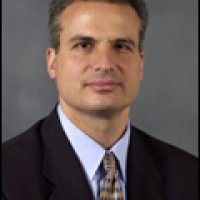Egypt and the Middle East: A Turkish Model of Democracy?
Recent political unrest in the Middle East has prompted a debate about whether Turkey, a transitioning democracy with Islamic roots, can serve as a model for political transformation in the Arab world. The panelists highlighted the distinctiveness of the "Turkish model" of governance and raised doubts about its potential to inform the political discourse in the revolting Middle East.
Whether Turkey can serve as a model, John Sitilides noted, will depend on "which Turkey you are referring to." He touched on various transformations of the Turkish state since its founding in 1923. The Turkish system has shifted from its Kemalist origins (1923-2002), when the military served as guardian of the secular state and where Islam was frequently subdued, to one in which a moderate Islamic party governs, initially embracing Western institutions and introducing bold reforms towards EU accession. Referencing the recent detention of journalists, Sitilides also noted that speculation abounded as to the degree to which Turkey was developing into a more authoritarian system. Lately, he added, Turkey's foreign policy agenda was "raising eyebrows" both in the U.S. and in European capitals. This was true in particular with regard to Turkey's efforts to create a strategic trading partnership with Iran and friendlier ties with Hezbollah and Hamas.
Henri Barkey stressed the importance of the process of change in the Middle East. Time is needed for reforms as well as the political will to allow transformation to take effect. Barkey noted that Turkey has been on a 30-year path of democratic and economic reform. He argued that Turkey's democratic achievements today were not primarily a result of the efforts of the ruling Justice and Development Party (AKP). Rather the rise of the AKP was a product of the democratization process. He also noted that AKP's emergence could be considered a consequence of the mistakes made by the military as an "overbearing overlord" of the state which had alienated the public. Barkey credits much of the transformation in Turkey to the economic reforms instituted in the 1980's by Prime Minister and later President Turgut Ozal.
Ambassador Toscano discussed the role of religion and nationalism in Turkey and the Arab world. In most Arab countries the idea of a "secular state" was an elite concept that is strange to the general population. By contrast, in Turkey national identity, linked to the state, has always been strong. In the Middle East, he explained, regionalism, tribalism and religious identity often trumped any sense of nationalism. With its long history of secularism and lack of a post-colonial syndrome, the Turkish experience was unlikely to translate to the Arab region. However, Toscano believes that Turkey does serve as an example that Islam and democracy coexist. In short, Turkey can be a very interesting and relevant source of inspiration for those who in North Africa and the Middle East try to find new formulas for state power - and for the relationship between state and civil society, state and religion. Saying that it can be a model, instead, could be misleading and the source of misunderstanding and mistakes.
Steven Cook also questioned whether the political-military situation in Egypt can be compared with that in Turkey. Some argue that the Turkish General Staff has at times played a "moderator" role in Turkish politics. However, he posited, reform in Turkey had taken place not because of military intervention, but despite it. He questioned if the Egyptian military, which is so deeply entwined with the Mubarak regime, could play a similar role in helping the country's transition. Comparing the AKP and the Muslim Brotherhood, Cook emphasized that both groups are fundamentally seated in Islam but that the Muslim Brotherhood's worldview varied considerably. He raised concern that the Brotherhood's ultimate goal was to "Islamicize" society and institute Shariah law. Whatever the case, Cook conceded expectations should be that Turkey will try to help influence, or encourage, political developments in certain ways in the region.
By Andri Orphanides
Christian Ostermann, Director, European Studies and History and Public Policy Program
Speakers


Senior Fellow, Council on Foreign Relations
Hosted By

Global Europe Program
The Global Europe Program is focused on Europe’s capabilities, and how it engages on critical global issues. We investigate European approaches to critical global issues. We examine Europe’s relations with Russia and Eurasia, China and the Indo-Pacific, the Middle East and Africa. Our initiatives include “Ukraine in Europe”—an examination of what it will take to make Ukraine’s European future a reality. But we also examine the role of NATO, the European Union and the OSCE, Europe’s energy security, transatlantic trade disputes, and challenges to democracy. The Global Europe Program’s staff, scholars-in-residence, and Global Fellows participate in seminars, policy study groups, and international conferences to provide analytical recommendations to policy makers and the media. Read more


History and Public Policy Program
A leader in making key foreign policy records accessible and fostering informed scholarship, analysis, and discussion on international affairs, past and present. Read more


Middle East Program
The Wilson Center’s Middle East Program serves as a crucial resource for the policymaking community and beyond, providing analyses and research that helps inform US foreign policymaking, stimulates public debate, and expands knowledge about issues in the wider Middle East and North Africa (MENA) region. Read more
